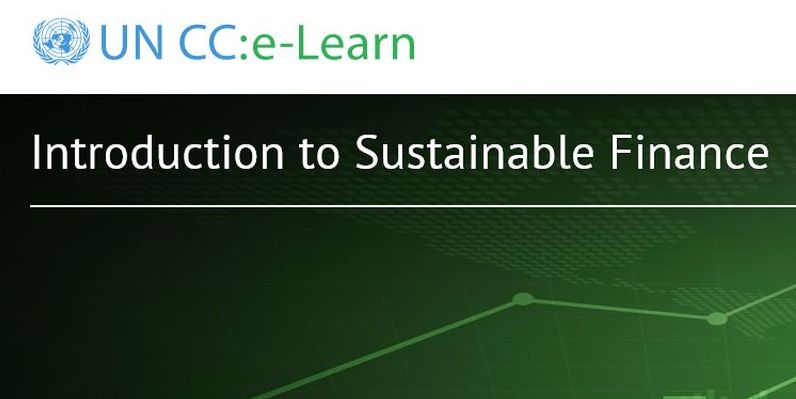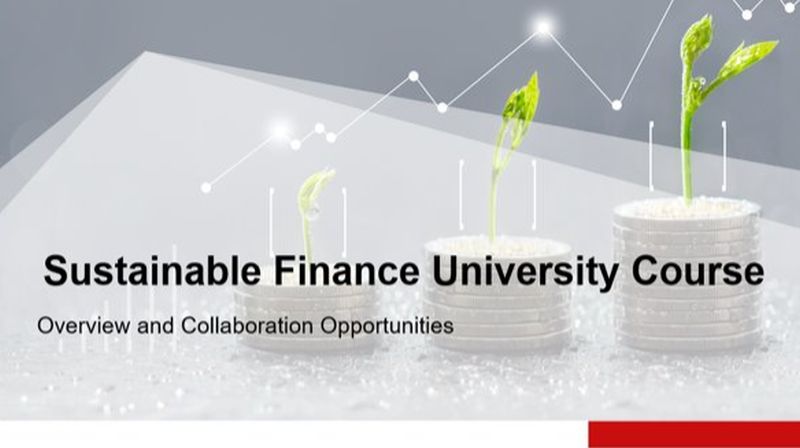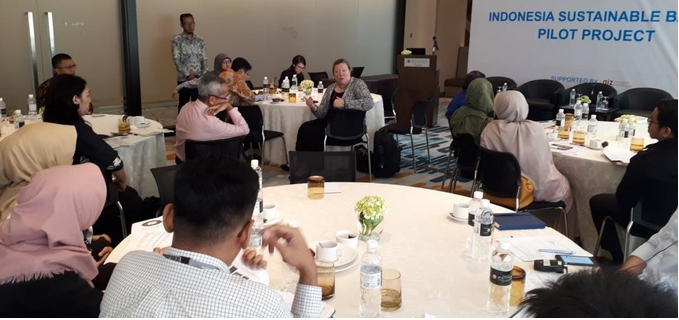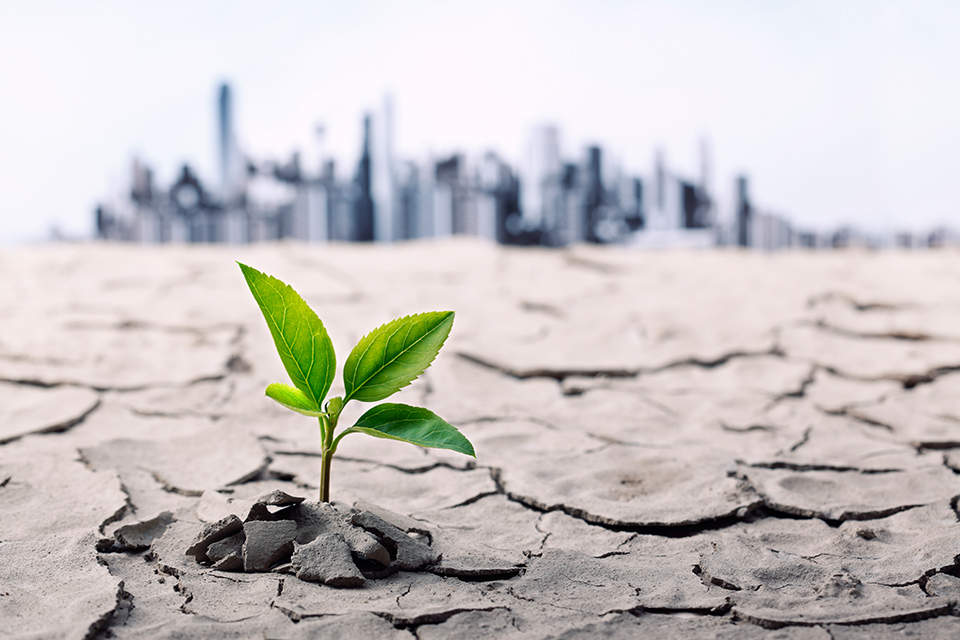SUSTAINABLE FINANCE
EMSD serves as an independent knowledge platform and incubator for the promotion of sustainable finance in and with emerging markets. We build our work on years of multi-stakeholder engagement with change makers from the private and public sector to advance the global debate and action on building a sustainable financial system that is aligned with the global goals of the 2030 Agenda and the Paris Agreement. To our partners, we offer technical expertise, financial support and the reach of GIZ’s global network to help implement and scale innovative solutions for sustainable finance.
OUR MOTIVATION
To help develop a sustainable financial system that serves both people and the planet
Delivering the targets of the Paris Agreement and the Sustainable Development Goals does not only require massive public and private investments in a sustainable future – it also requires a fundamental socio-economic transition supported by a financial system that is aligned with sustainable development. In recent years, new approaches, strategies, standards and tools have emerged, driven by the G20’s Green or Sustainable Finance work streams, the FSB’s Task Force on Climate-related Financial Disclosures (TCFD), the Central Bankers’ Network for Greening the Financial System (NGFS), the Principles for Responsible Investment (PRI) as well as numerous other public and private sector initiatives. Yet, shortcomings in data, tools and capacities as well as structural challenges concerning environmental, social and economic risks and opportunities constrain the mainstreaming of sustainability considerations in financial decision-making.
OUR WORK
Developing and scaling innovations to mainstream sustainability in the financial system
EMSD seeks to advance the development of sustainable financial systems that foster the transformation towards economies that positively affect the environment and human lives. To achieve this, EMSD collaborates closely with banks, institutional investors, stock exchanges, financial policymakers and regulators, as well as other market participants from G20 economies to integrate environmental, social and governance (ESG) indicators into mainstream financial decision-making processes, risk management, product and market development as well as knowledge products. Jointly with our partners, we develop and pilot the implementation of sustainable solutions by doing research, developing and adopting methodologies and tools as well as strengthening technical capacities and dialogue among stakeholders with the aspiration to scale sustainability tools and strategies across sectors and regions.
Learn more about EMSD’s work on Sustainable Finance
Contact: yannick.motz@giz.de
E-Learning Introduction to Sustainable Finance
E-Learning Introduction to Sustainable Finance
In collaboration with CICERO Center for International Climate Research, Skandinaviska Enskilda Banken AB (SEB) and UN PAGE, EMSD has designed an introductory online course to Sustainable Finance for practitioners from financial institutions, the public sector and civil society.
Sustainable Finance University Course
Sustainable Finance University Course
In collaboration with CICERO Center for Internal Climate Research, partner universities and experts from finance and academia, EMSD is developing a comprehensive blueprint for a sustainable finance course programme to integrate the topic into university curricula.
Our Past Initiatives on Sustainable Finance
Environmental Scenario Analysis
This joint project of the University of Cambridge Institute for Sustainability Leadership (CISL) and the Emerging Markets Dialogue on Finance (EMDF) focuses on improving the integration of environmental risks into financial decision-making in emerging markets.
Green Assets Wallet
The Green Assets Wallet (GAW) initiative aims to scale up the market for trusted green investments in order to support the delivery on the United Nations’ Sustainable Development Goals and the objectives of the Paris Climate Agreement. The initiative develops a blockchain-based technology for validating green investment claims.
Sustainable Banking
Once banks’ lending and investment decisions follows stringent environmental, social and governance (ESG) criteria, the leverage effect for positive impact can be tremendous. In order to support the transformation of the Indonesian economy, the Sustainable Banking initiative aims at promoting sustainable finance practices in its banking sector.
Environmental Stress Testing
Within the project of Environmental Stress Testing, an innovative analytical framework and open-source tool was developed and tested that allows banks to assess potential impact of drought events on the performance of their corporate loan portfolio.
Green Bond Market Development
The green bond pioneer Skandinaviska Enskilda Banken (SEB) and the Emerging Markets Dialogue on Finance, initiated in early 2016 a develoPPP public-private partnership with the objective to support the development of prosperous and sustainable green bond markets in Brazil, China, India and Mexico.
Sustainable Stock Exchanges
Stock exchanges play an important role in promoting improved environmental, social and governance (ESG) disclosure and performance among listed companies in equity and debt capital markets.
Fintech & Sustainability
Indigent populations in low/middle income countries can benefit from emerging opportunities of rapid technological advancements. Fintech can act as poverty reduction catalyst by empowering communities in need through increased saving, formalised businesses and greater access to microfinance.
Natural Capital & Finance
In many emerging markets, the financial system is significantly exposed to natural capital risks as many sectors are heavily reliant on natural resources. Given the often insufficient availability of adequate data and methodologies and lack of awareness and expertise, investors are typically poorly equipped in addressing such risks.
Water Risk in Corporate Bond Analysis
Extreme weather events such as droughts are becoming more frequent and severe worldwide. Given the related detrimental effects on economic activity, water risks are already considered by rating agencies such as S&P and Moody’s as a significant factor impacting the creditworthiness of companies.
Environmental Scenario Analysis
This joint project of the University of Cambridge Institute for Sustainability Leadership (CISL) and the Emerging Markets Dialogue on Finance (EMDF) focuses on improving the integration of environmental risks into financial decision-making in emerging markets.
Green Assets Wallet
The Green Assets Wallet (GAW) initiative aims to scale up the market for trusted green investments in order to support the delivery on the United Nations’ Sustainable Development Goals and the objectives of the Paris Climate Agreement. The initiative develops a blockchain-based technology for validating green investment claims.
Sustainable Banking
Once banks’ lending and investment decisions follows stringent environmental, social and governance (ESG) criteria, the leverage effect for positive impact can be tremendous. In order to support the transformation of the Indonesian economy, the Sustainable Banking initiative aims at promoting sustainable finance practices in its banking sector.
Fintech & Sustainability
Indigent populations in low/middle income countries can benefit from emerging opportunities of rapid technological advancements. Fintech can act as poverty reduction catalyst by empowering communities in need through increased saving, formalised businesses and greater access to microfinance.
Water Risk in Corporate Bond Analysis
Extreme weather events such as droughts are becoming more frequent and severe worldwide. Given the related detrimental effects on economic activity, water risks are already considered by rating agencies such as S&P and Moody’s as a significant factor impacting the creditworthiness of companies.
Environmental Stress Testing
Within the project of Environmental Stress Testing, an innovative analytical framework and open-source tool was developed and tested that allows banks to assess potential impact of drought events on the performance of their corporate loan portfolio.
Green Bond Market Development
The green bond pioneer Skandinaviska Enskilda Banken (SEB) and the Emerging Markets Dialogue on Finance, initiated in early 2016 a develoPPP public-private partnership with the objective to support the development of prosperous and sustainable green bond markets in Brazil, China, India and Mexico.
Sustainable Stock Exchanges
Stock exchanges play an important role in promoting improved environmental, social and governance (ESG) disclosure and performance among listed companies in equity and debt capital markets.
Natural Capital & Finance
In many emerging markets, the financial system is significantly exposed to natural capital risks as many sectors are heavily reliant on natural resources. Given the often insufficient availability of adequate data and methodologies and lack of awareness and expertise, investors are typically poorly equipped in addressing such risks.












